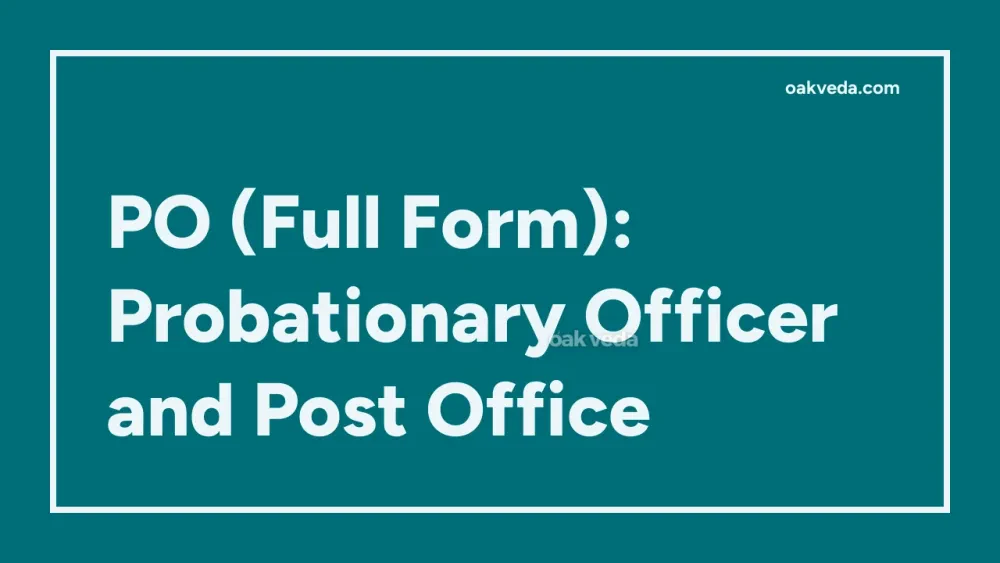
What is the Full Form of PO?
The abbreviation PO has two common full forms: Probationary Officer and Post Office. Both play significant roles in different sectors of society, namely banking and postal services.
What is a Probationary Officer (PO)?
A Probationary Officer (PO) is an entry-level position in Indian banks. It serves as a training ground for new recruits, allowing them to gain comprehensive experience across various banking operations.
Origin and Development of Probationary Officer
The concept of Probationary Officers in Indian banking emerged as a structured approach to train and develop future banking leaders. This system has evolved over the years to meet the changing needs of the banking sector.
How does the Probationary Officer role work?
During the probation period, which typically lasts 1-2 years, POs rotate through different departments of the bank. This rotation exposes them to various aspects of banking operations, including:
- Cheque processing
- Account opening
- Foreign exchange
- Credit rating
- Loan processing
- Treasury operations
Functions of a Probationary Officer
POs are tasked with a wide range of responsibilities:
- Learning bank policies and procedures
- Assisting senior officers in daily operations
- Handling customer queries and complaints
- Participating in training programs
- Contributing to team projects
Applications of the Probationary Officer Program
The PO program serves multiple purposes:
- Talent development: Nurturing future banking leaders
- Skill enhancement: Providing hands-on experience in various banking functions
- Organizational growth: Infusing fresh perspectives into the banking system
Features of the Probationary Officer Role
- Comprehensive training: POs receive extensive training in all aspects of banking
- Job rotation: Regular movement across departments ensures well-rounded experience
- Performance evaluation: Continuous assessment helps in identifying potential leaders
- Career progression: Successful POs can advance to higher managerial positions
Benefits of the Probationary Officer Program
For candidates:
- Secure job in the banking sector
- Opportunity for rapid career growth
- Comprehensive understanding of banking operations
For banks:
- Creation of a skilled workforce
- Identification of future leaders
- Improved operational efficiency
Eligibility Criteria for Probationary Officer
To become a Probationary Officer in an Indian bank:
- Educational qualification: Graduation from a recognized university
- Age limit: Varies by bank, typically 20-30 years
- Selection process: Competitive exam followed by interviews
Note: Age relaxation is provided for certain categories:
- OBC candidates: 3 years
- SC/ST candidates: 5 years
What is a Post Office (PO)?
A Post Office (PO) is a public facility that provides a range of postal and related services. It's an integral part of the national postal system, serving as a crucial communication link for communities.
Origin and Development of Post Offices
Post offices have a rich history dating back centuries. In India, the modern postal system was established during the British colonial era and has since evolved into a vast network covering the entire country.
How does a Post Office work?
Post offices operate as centralized hubs for mail collection, sorting, and distribution. They also offer various additional services to meet community needs.
Functions of a Post Office
- Mail services: Collecting, sorting, and delivering letters and packages
- Selling postage stamps and stationery
- Providing P.O. boxes for mail reception
- Offering money order and electronic fund transfer services
- Facilitating government services (e.g., pension disbursement, tax form distribution)
Types of Post Offices
- Head Post Offices: Main offices in cities or large towns
- Sub Post Offices: Smaller offices in urban areas
- Branch Post Offices: Rural post offices with limited services
Applications of Post Offices
Post offices serve multiple purposes in modern society:
- Communication hub: Facilitating correspondence and package delivery
- Financial services: Offering savings accounts and money transfer services
- Government interface: Providing access to various government forms and services
- Community center: Serving as a focal point for local information and services
Features of Post Offices
- Wide network: Extensive coverage, even in remote areas
- Diverse services: Offering postal, financial, and government services
- Affordable rates: Providing cost-effective mailing options
- Reliability: Trusted institution for secure communication and transactions
Benefits of Post Offices
- Universal access to postal services
- Affordable communication and package delivery
- Convenient access to government services
- Financial inclusion through postal banking services
Challenges faced by Post Offices
- Competition from private courier services
- Declining letter mail volumes due to digital communication
- Need for technological upgrades to improve efficiency
- Balancing traditional services with modern customer expectations
Future Developments in Post Office Services
Post offices are adapting to the digital age by:
- Expanding e-commerce parcel services
- Introducing digital mailboxes
- Enhancing financial services through mobile banking
- Exploring new revenue streams like passport services and bill payments
FAQs on PO Full Form
-
What is the primary role of a Probationary Officer? A Probationary Officer's main role is to undergo comprehensive training in various banking operations to prepare for future leadership positions.
-
How long does the probation period last for a PO in Indian banks? The probation period typically lasts 1-2 years, depending on the bank's policies.
-
Can Post Offices provide banking services? Yes, many post offices offer basic banking services like savings accounts and money transfers.
-
Who heads a Post Office? The chief administrator of a post office is called a Postmaster.
-
Are Post Offices still relevant in the digital age? Yes, post offices remain relevant by adapting their services to include e-commerce support, digital communication, and various government services.
You may be interested in:

